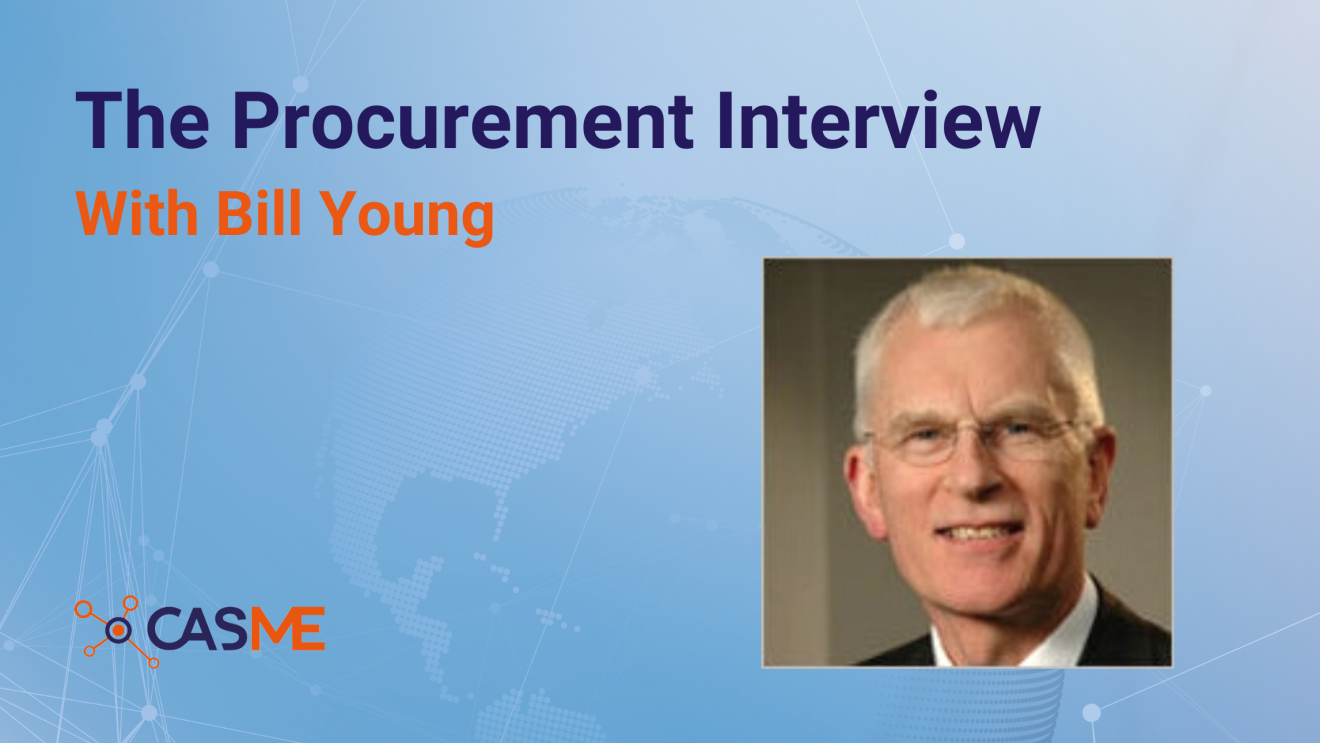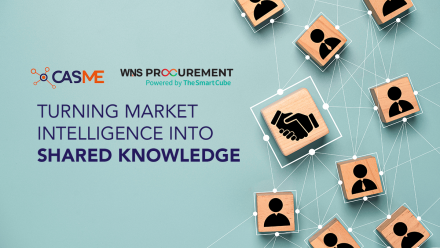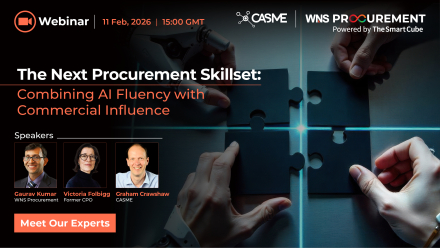
Bill Young is an expert in value creation, procurement, supply chain and outsourcing; he facilitates CASME events in the European region, with particular specialisms in Professional and Business Services, IT and Facilities Management. He looks back on his career in Procurement, sharing why it’s so important to keep your options open, to learn from others, and to continually network – telling us what that actually means.
1. How did you get into Procurement?
I was a product manager at an agrochemical company, with some experience of capital expenditure proposals and complex contracts when the Head of Procurement and Supply asked me to join the function.
We had to source three chemical intermediates for a new blockbuster product (generating at least 1bn annual sales revenue), that was due to be launched in just over two years. We needed thousands of tonnes, but no company made any of them at higher than laboratory scale. From the first engagement with potential suppliers, a variety of problems emerged; the personalities, organisations, and technologies made each unique. One was especially challenging.
At the first meeting with the only possible supplier, we discovered that to meet our requirements, it needed to build a new, dedicated plant, from the foundations up. The difficulties appeared mind-boggling, and the timescale almost impossible. We agreed on an open-book contract, guaranteeing the supplier a return on net assets on the new investment, even though neither of us had any experience of such a deal. As scheduled, twenty-four months later, the first tankers of chemicals rolled into Grangemouth in Scotland. The product got launched, and I was in Procurement.
2. What has been the biggest challenge of your career so far?
I’d like to reference my early experiences in Procurement. I had a team of procurement people reporting to me, covering everything from customs, fleet, and facilities, to purchase-for-resale, and later, IT. I hadn’t a clue what they did, how they did it, nor even why they did it! Fortunately, the next office was occupied by a dependable, long-suffering, highly experienced and senior procurement hero who would patiently explain R2P, ERP, RFPs and much more to me. There were many others for whose generosity and goodwill I will always be grateful.
Moral:
1. Don’t believe those who try to persuade you that anyone can buy things.
2. Be humble and unafraid to admit what you don’t know. I learned that most people are generous and kind, some heroically so. I decided consciously to try to copy them.
3. What has been the most significant success of your career so far?
Something you may not expect me to choose – becoming an independent consultant. Shortly after a merger, it became clear that my new boss and I agreed on nothing. Independence was something I valued, so I got out.
When you are independent, you need to balance three things:
1. Perform work (to earn money)
2. Find work
3. Maintain your relevance
This can be stressful. Networking is essential, but networking is not what many think. It is not about schmoozing and lunching; it is not about creating obligations, calling in favours, and keeping score; it is not even about social media and your contacts list. Networking is attempting to display generosity and kindness to everyone you meet, regardless of their imagined value to you.
Moral:
When you see and admire qualities in your colleagues, try and copy them.
4. What advice would you give to someone starting a career in Procurement – especially young people?
Be inquisitive.
In Procurement, you see things others cannot; things that need to be fixed or improved. Learn to ask questions and practise them consistently.
If I may be permitted to adulterate Rudyard Kipling’s poem, The Elephant’s Child from the Just-So Stories, by inserting four lines to the introduction.
I keep six honest serving-men
(They taught me all I knew);
Their names are What and Why and When
And How and Where and Who.
But wiser still is she who’ll go
In boardroom, bar or souk,
And learn all that she needs to know
From a silent, inquisitive look.
When you think you have understood – but it feels wrong – check it again. Then DO something! Otherwise, it will make you resentful, frustrated, cynical or apathetic. You’ll need diplomatic skills. Develop them by trial and error. If you ever need to provoke, do it with humour.
Moral:
To survive in Procurement, you must be inquisitive; or be a zombie.
5. How do you think we could get more young people interested in Procurement?
Procurement isn’t a place where young people usually want to end up. It is held back by a significant internal conflict. This is between its reputation for delivering cost savings, and its aspiration to support and lead business improvement and change. There are talented individuals in Procurement who manage this discord with skill and verve, and even deliver on both. These are isolated, stand-out stars, however. They are not part of the fabric and culture, and their capabilities are not scalable.
If Procurement were to address and lead on opportunities such the company’s response to climate change, total workforce solutions, risk management and innovation, then young people would be more engaged in wanting to be a part of this corporate movement. I’ve waited too long for this, and I’m resigned to the fact that it may not happen tomorrow morning.
6. Finally, putting Procurement aside (just for a moment), what inspires and motivates you?
I fear I am a typical introvert, enjoying lots of things I am no good at. These things include reading modern history and biographies, learning the guitar, and building kit models with my grandchildren. However, there is one thing I find myself sucked into and inspired about: combatting climate change.
Back to News



